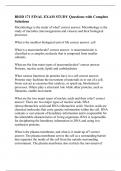Biod 171 final - Study guides, Class notes & Summaries
Looking for the best study guides, study notes and summaries about Biod 171 final? On this page you'll find 1001 study documents about Biod 171 final.
Page 4 out of 1.001 results
Sort by

-
Biod 171 Final Exam new 2022 Questions And Answers
- Exam (elaborations) • 12 pages • 2024
- Available in package deal
-
- $9.49
- + learn more
Biod 171 Final Exam new 2022 Questions And Answers Which of the following are considered Protista? Select all that apply. Bacteria Amoeba Correct! Algae Correct! Yeast Question 2 2 / 2 pts True or False: A defining characteristic of Protista is the inability of colonies to form tissue layers. True Correct! False Question 3 2 / 2 pts The function of the ribosome is (select all that apply): To produce energy (ATP) Lipid synthesis Protein synthesis Correct! Ribosomes are l...
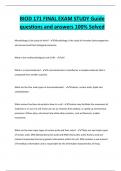
-
BIOD 171 FINAL EXAM STUDY Guide questions and answers 100% Solved
- Exam (elaborations) • 20 pages • 2024
- Available in package deal
-
- $13.99
- + learn more
BIOD 171 FINAL EXAM STUDY Guide questions and answers 100% Solved Microbiology is the study of what? - Microbiology is the study of microbes (microorganisms and viruses) and their biological processes. What is the smallest biological unit of life - cell What is a macromolecule? - A macromolecule is classified as a complex molecule that is composed from smaller subunits. What are the four main types of macromolecules? - Proteins, nucleic acids, lipids and carbohydrates What vario...
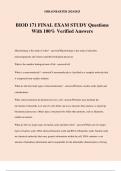
-
BIOD 171 FINAL EXAM STUDY Questions With 100% Verified Answers
- Exam (elaborations) • 20 pages • 2024
-
- $11.49
- + learn more
BIOD 171 FINAL EXAM STUDY Questions With 100% Verified Answers Microbiology is the study of what? - answerMicrobiology is the study of microbes (microorganisms and viruses) and their biological processes. What is the smallest biological unit of life - answercell What is a macromolecule? - answerA macromolecule is classified as a complex molecule that is composed from smaller subunits. What are the four main types of macromolecules? - answerProteins, nucleic acids, lipids and carbohydrate...
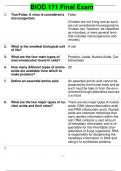
-
1 / 32 BIOD 171 Final Exam
- Exam (elaborations) • 32 pages • 2024
-
- $12.49
- + learn more
1 / 32 BIOD 171 Final Exam 1. True/False. A virus is considered a microorganism. 2. What is the smallest biological unit of life? 3. What are the four main types of macromolecules found in cells? 4. How many different types of amino acids are available from which to make proteins? False (Viruses are not living and as such are not considered microorganisms. Viruses can, however, be classified as microbes, a more general term that includes microorganisms and viruses.) A cell Pro...
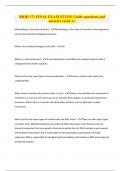
-
BIOD 171 FINAL EXAM STUDY Guide questions and answers rated A+
- Exam (elaborations) • 19 pages • 2024
-
Available in package deal
-
- $9.99
- + learn more
BIOD 171 FINAL EXAM STUDY Guide questions and answers rated A+ Microbiology is the study of what? - Microbiology is the study of microbes (microorganisms and viruses) and their biological processes. What is the smallest biological unit of life - cell What is a macromolecule? - A macromolecule is classified as a complex molecule that is composed from smaller subunits. What are the four main types of macromolecules? - Proteins, nucleic acids, lipids and carbohydrates What various functions do...
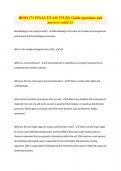
-
BIOD 171 FINAL EXAM STUDY Guide questions and answers rated A+
- Exam (elaborations) • 19 pages • 2024
- Available in package deal
-
- $10.48
- + learn more
BIOD 171 FINAL EXAM STUDY Guide questions and answers rated A+ Microbiology is the study of what? - Microbiology is the study of microbes (microorganisms and viruses) and their biological processes. What is the smallest biological unit of life - cell What is a macromolecule? - A macromolecule is classified as a complex molecule that is composed from smaller subunits. What are the four main types of macromolecules? - Proteins, nucleic acids, lipids and carbohydrates What various function...
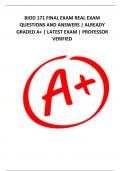
-
BIOD 171 FINAL EXAM REAL EXAM QUESTIONS AND ANSWERS | ALREADY GRADED A+ | LATEST EXAM | PROFESSOR VERIFIED
- Exam (elaborations) • 18 pages • 2023
- Available in package deal
-
- $25.99
- + learn more
BIOD 171 FINAL EXAM REAL EXAM QUESTIONS AND ANSWERS | ALREADY GRADED A+ | LATEST EXAM | PROFESSOR VERIFIED
BIOD 171 FINAL EXAM STUDY Questions with Complete Solutions.
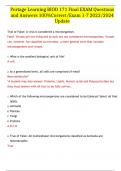
-
BIOD 171 Portage Learning Final EXAM Questions and Answers 100%Correct/Exam 1-7 2023/2024 Update
- Exam (elaborations) • 44 pages • 2023
-
- $20.99
- 5x sold
- + learn more
BIOD 171 Portage Learning Final EXAM Questions and Answers 100%Correct/Exam 1-7 2023/2024 UpdatePortage Learning BIOD 171 Final EXAM Questions and Answers 100%Correct/Exam 1-7 2023/2024 Update True or False: A virus is considered a microorganism. False. Viruses are not living and as such are not considered microorganisms. Viruses can, however, be classified as microbes, a more general term that includes microorganisms and viruses. 1. What is the smallest biological unit of life? A cell. ...
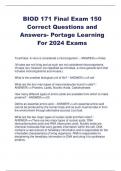
-
BIOD 171 Final Exam 150 Correct Questions and Answers- Portage Learning For 2024 Exams
- Exam (elaborations) • 29 pages • 2024
-
- $31.99
- + learn more
BIOD 171 Final Exam 150 Correct Questions and Answers- Portage Learning For 2024 Exams.BIOD 171 Final Exam 150 Correct Questions and Answers- Portage Learning For 2024 Exams.BIOD 171 Final Exam 150 Correct Questions and Answers- Portage Learning For 2024 Exams.BIOD 171 Final Exam 150 Correct Questions and Answers- Portage Learning For 2024 Exams.BIOD 171 Final Exam 150 Correct Questions and Answers- Portage Learning For 2024 Exams.BIOD 171 Final Exam 150 Correct Questions and Answers- Porta...

Did you know that on average a seller on Stuvia earns $82 per month selling study resources? Hmm, hint, hint. Discover all about earning on Stuvia



